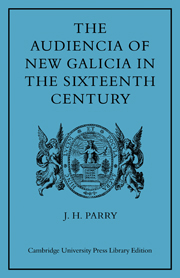Book contents
- Frontmatter
- Contents
- Preface
- List of abbreviations
- Introduction
- PART I THE SUBORDINATE AUDIENCIA, 1548–72
- CHAPTER I The Conquest of New Galicia
- Chapter II The Foundation of the Audiencia
- Chapter III The Audiencia and the Indians
- Chapter IV The Audiencia and the Conquistadores
- Chapter V The Audiencia and the Church
- Chapter VI The Reorganisation of the Audiencia, 1570–72
- PART II THE AUDIENCIA AND ROYAL CHANCELLERY, 1572–1600
- Conclusion
- Appendix A Specimen Title of Encomienda in New Galigia
- Appendix B Specimen Appointment of a Corregidor in New Galigia
- Index
- Plate section
Chapter II - The Foundation of the Audiencia
Published online by Cambridge University Press: 07 October 2011
- Frontmatter
- Contents
- Preface
- List of abbreviations
- Introduction
- PART I THE SUBORDINATE AUDIENCIA, 1548–72
- CHAPTER I The Conquest of New Galicia
- Chapter II The Foundation of the Audiencia
- Chapter III The Audiencia and the Indians
- Chapter IV The Audiencia and the Conquistadores
- Chapter V The Audiencia and the Church
- Chapter VI The Reorganisation of the Audiencia, 1570–72
- PART II THE AUDIENCIA AND ROYAL CHANCELLERY, 1572–1600
- Conclusion
- Appendix A Specimen Title of Encomienda in New Galigia
- Appendix B Specimen Appointment of a Corregidor in New Galigia
- Index
- Plate section
Summary
It was the fixed policy of Spanish imperial government to entrust to its agents in the Indies the minimum of independent authority compatible with effective administration. The Council of the Indies was particularly suspicious of new and untried institutions, and in placing an audiencia in the wild and remote ranges of New Galicia it made use of every possible device to ensure that all important decisions of the new court should be reviewed by the existing authorities in Mexico City or in Spain. The coupling of the title of oidor with the less dignified one of alcalde mayor in itself emphasised the subordinate status of the newly appointed justices. There was a close analogy in this respect with the organisation of Galicia in Spain, where the judges of the audiencia held the title of alcalde mayor and where appeals from their decisions lay to the oidores of the audiencia of Valladolid. The composite title was peculiar to New Galicia. Like the audiencia of Galicia in Spain, the New Galicia court held no royal seal—was not a chancellery.
The district assigned to the new audiencia—assigned, of course, after consultation with the viceroy and oidores of New Spain—was much smaller than that suggested by Tejada in 1544. The ordinances of 1548 mentioned only the new kingdom of Galicia—that is, the territory actually conquered by Nuño de Guzmán and governed by his successors, with the acquisitions added by mining prospectors in the north.
- Type
- Chapter
- Information
- The Audiencia of New Galicia in the Sixteenth CenturyA Study in Spanish Colonial Government, pp. 35 - 54Publisher: Cambridge University PressPrint publication year: 1969



